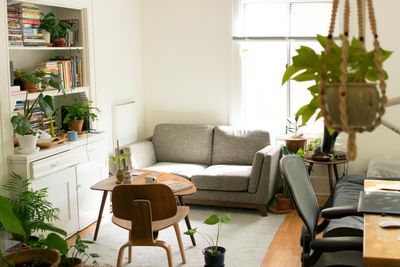The easiest ways to make the most out of your studio apartment
For many people, including myself, there is something magical about the apartment lifestyle.
And living in New York City for years, I've seen the pros of having a studio apartment.
Not only can rent be more affordable, but access to amenities and other perks can also be perfect for those who are just starting to venture out on their own.
But there is no denying that studio apartments or small apartments, in particular, don't provide optimal storage space.
While this may be ideal for a college student who doesn't require more than a spot to eat and a bed, some of us may find ourselves in a cluttered mess.
So how can you work with the space you have?
Through careful planning and some creative storage solutions, rest assured that you will maximize your living area without feeling that your space is covered in many things.
Below are some ways that I made the most out of my living space.
Opt for a twin or full-size bed.
Living in a studio apartment, I opted to have a twin-sized bed because it provided more space for a mini couch, table and overall legroom to walk around freely!
If a twin bed is way too small for you, a full size could be of help.
Increase the natural lighting.
Natural light has a way of making any room feel more open and airy, so take advantage of it as much as you can. Choose a partition that lets in lots of light if you want to utilize it to create the illusion of separate rooms in your studio.
Shelving can effectively divide the bedroom from the living area while allowing ample light to flood the entire space.
Mirrors upon mirrors.
When it comes to the capacity to enrich a tiny studio, mirrors are nearly miraculous. The more reflective surfaces you have in your room, the larger the room appears.
Investing in a large, beautiful piece reduces claustrophobic feelings by visually opening things up and generating the illusion of more space.
Organisation is essential.
In a studio apartment, organisation will become your best friend. Its boundless powers will spare you many headaches when it comes to keeping things neat, clean, and chic if optimized, so familiarize yourself with it.
Open closets or an armoire wardrobe.
The lack of closet space can be one of the most challenging things faced while living in a studio, especially for those who may or may not have a shopping issue or a strong desire to keep up with the latest fashion trends.
Fortunately, making your own is both simple and inexpensive.
Create an open, efficient closet that matches your taste rather than looking for methods to clutter and hide your items. Just make sure everything is hung up so it doesn't look too messy.
On the other hand, an armoire wardrobe is excellent because it can act as a closet in your unit if you don't already have one. It can also lie against the wall and out of the way.
Open shelves.
The same logic that applies to open closets also applies to open shelving. If your living area is lacking in storage, use this way to make your own. That being said, you don't want to slap stuff on there recklessly.
Organizing objects by style, size, and color will help you maintain a consistent aesthetic.
What are some things that have helped you maximise your living space?
